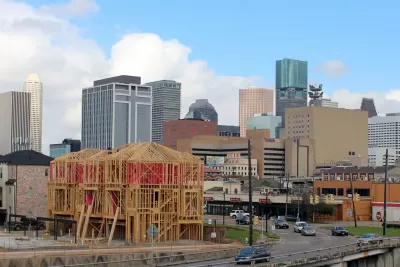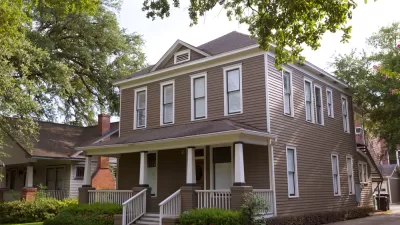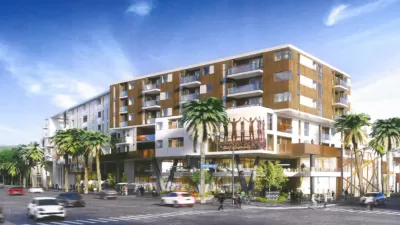A lawsuit argues that Houston's Historic Preservation Ordinance is a form of de facto land use control, equivalent to zoning, which isn't allowed by state and local laws.

Ryan Nickerson reports on a legal controversy that could decide the future of land use control in the U.S. city most famous for rejecting the most common form of land use controls.
A pair of local homeowners are attempting to make the legal case that the city of Houston's Historic Preservation Ordinance (HPO) constitutes a form of de facto zoning—a system of land use control that is ostensibly not allowed in the city.
"In a brief filed on behalf of Powell and Luccia on Sept. 8, Houston lawyer Matthew Festa said that Texas law does not support, 'a vague and unlimited power for local governments to regulate property rights without limitation,'" explains Nickerson.
Festa argues that the city's HPO "[limits] individual property rights to create restrictive historic zoning districts, ignoring the requirements set forth by the Texas Legislature and the people of Houston," according to the article.
Sara Bronin, Real Property Law professor at the University of Connecticut Law School and a land use reformer in the state of Connecticut, is quoted in the article saying that the legal argument presented by the plaintiffs is novel in the legal system. More on the history of the lawsuits against the HPO, and the history of the HPO, itself is included in the article.
FULL STORY: Heights homeowners take fight over preservation ordinance to state Supreme Court

Planetizen Federal Action Tracker
A weekly monitor of how Trump’s orders and actions are impacting planners and planning in America.

Maui's Vacation Rental Debate Turns Ugly
Verbal attacks, misinformation campaigns and fistfights plague a high-stakes debate to convert thousands of vacation rentals into long-term housing.

Restaurant Patios Were a Pandemic Win — Why Were They so Hard to Keep?
Social distancing requirements and changes in travel patterns prompted cities to pilot new uses for street and sidewalk space. Then it got complicated.

In California Battle of Housing vs. Environment, Housing Just Won
A new state law significantly limits the power of CEQA, an environmental review law that served as a powerful tool for blocking new development.

Boulder Eliminates Parking Minimums Citywide
Officials estimate the cost of building a single underground parking space at up to $100,000.

Orange County, Florida Adopts Largest US “Sprawl Repair” Code
The ‘Orange Code’ seeks to rectify decades of sprawl-inducing, car-oriented development.
Urban Design for Planners 1: Software Tools
This six-course series explores essential urban design concepts using open source software and equips planners with the tools they need to participate fully in the urban design process.
Planning for Universal Design
Learn the tools for implementing Universal Design in planning regulations.
Heyer Gruel & Associates PA
JM Goldson LLC
Custer County Colorado
City of Camden Redevelopment Agency
City of Astoria
Transportation Research & Education Center (TREC) at Portland State University
Jefferson Parish Government
Camden Redevelopment Agency
City of Claremont





























